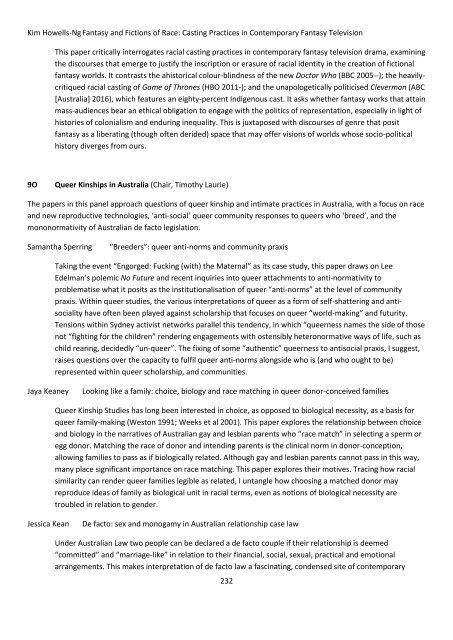Crossroads in Cultural Studies Conference 14-17th December 2016 Program Index
Crossroads-2016-final-draft-program-30-Nov
Crossroads-2016-final-draft-program-30-Nov
Create successful ePaper yourself
Turn your PDF publications into a flip-book with our unique Google optimized e-Paper software.
Kim Howells-Ng Fantasy and Fictions of Race: Cast<strong>in</strong>g Practices <strong>in</strong> Contemporary Fantasy Television<br />
This paper critically <strong>in</strong>terrogates racial cast<strong>in</strong>g practices <strong>in</strong> contemporary fantasy television drama, exam<strong>in</strong><strong>in</strong>g<br />
the discourses that emerge to justify the <strong>in</strong>scription or erasure of racial identity <strong>in</strong> the creation of fictional<br />
fantasy worlds. It contrasts the ahistorical colour-bl<strong>in</strong>dness of the new Doctor Who (BBC 2005--); the heavilycritiqued<br />
racial cast<strong>in</strong>g of Game of Thrones (HBO 2011-); and the unapologetically politicised Cleverman (ABC<br />
[Australia] <strong>2016</strong>), which features an eighty-percent Indigenous cast. It asks whether fantasy works that atta<strong>in</strong><br />
mass-audiences bear an ethical obligation to engage with the politics of representation, especially <strong>in</strong> light of<br />
histories of colonialism and endur<strong>in</strong>g <strong>in</strong>equality. This is juxtaposed with discourses of genre that posit<br />
fantasy as a liberat<strong>in</strong>g (though often derided) space that may offer visions of worlds whose socio-political<br />
history diverges from ours.<br />
9O<br />
Queer K<strong>in</strong>ships <strong>in</strong> Australia (Chair, Timothy Laurie)<br />
The papers <strong>in</strong> this panel approach questions of queer k<strong>in</strong>ship and <strong>in</strong>timate practices <strong>in</strong> Australia, with a focus on race<br />
and new reproductive technologies, ‘anti-social’ queer community responses to queers who ‘breed’, and the<br />
mononormativity of Australian de facto legislation.<br />
Samantha Sperr<strong>in</strong>g<br />
“Breeders”: queer anti-norms and community praxis<br />
Tak<strong>in</strong>g the event “Engorged: Fuck<strong>in</strong>g (with) the Maternal” as its case study, this paper draws on Lee<br />
Edelman’s polemic No Future and recent <strong>in</strong>quiries <strong>in</strong>to queer attachments to anti-normativity to<br />
problematise what it posits as the <strong>in</strong>stitutionalisation of queer “anti-norms” at the level of community<br />
praxis. With<strong>in</strong> queer studies, the various <strong>in</strong>terpretations of queer as a form of self-shatter<strong>in</strong>g and antisociality<br />
have often been played aga<strong>in</strong>st scholarship that focuses on queer “world-mak<strong>in</strong>g” and futurity.<br />
Tensions with<strong>in</strong> Sydney activist networks parallel this tendency, <strong>in</strong> which “queerness names the side of those<br />
not “fight<strong>in</strong>g for the children” render<strong>in</strong>g engagements with ostensibly heteronormative ways of life, such as<br />
child rear<strong>in</strong>g, decidedly “un-queer”. The fix<strong>in</strong>g of some “authentic” queerness to antisocial praxis, I suggest,<br />
raises questions over the capacity to fulfil queer anti-norms alongside who is (and who ought to be)<br />
represented with<strong>in</strong> queer scholarship, and communities.<br />
Jaya Keaney<br />
Look<strong>in</strong>g like a family: choice, biology and race match<strong>in</strong>g <strong>in</strong> queer donor-conceived families<br />
Queer K<strong>in</strong>ship <strong>Studies</strong> has long been <strong>in</strong>terested <strong>in</strong> choice, as opposed to biological necessity, as a basis for<br />
queer family-mak<strong>in</strong>g (Weston 1991; Weeks et al 2001). This paper explores the relationship between choice<br />
and biology <strong>in</strong> the narratives of Australian gay and lesbian parents who “race match” <strong>in</strong> select<strong>in</strong>g a sperm or<br />
egg donor. Match<strong>in</strong>g the race of donor and <strong>in</strong>tend<strong>in</strong>g parents is the cl<strong>in</strong>ical norm <strong>in</strong> donor-conception,<br />
allow<strong>in</strong>g families to pass as if biologically related. Although gay and lesbian parents cannot pass <strong>in</strong> this way,<br />
many place significant importance on race match<strong>in</strong>g. This paper explores their motives. Trac<strong>in</strong>g how racial<br />
similarity can render queer families legible as related, I untangle how choos<strong>in</strong>g a matched donor may<br />
reproduce ideas of family as biological unit <strong>in</strong> racial terms, even as notions of biological necessity are<br />
troubled <strong>in</strong> relation to gender.<br />
Jessica Kean<br />
De facto: sex and monogamy <strong>in</strong> Australian relationship case law<br />
Under Australian Law two people can be declared a de facto couple if their relationship is deemed<br />
“committed” and “marriage-like” <strong>in</strong> relation to their f<strong>in</strong>ancial, social, sexual, practical and emotional<br />
arrangements. This makes <strong>in</strong>terpretation of de facto law a fasc<strong>in</strong>at<strong>in</strong>g, condensed site of contemporary<br />
232


